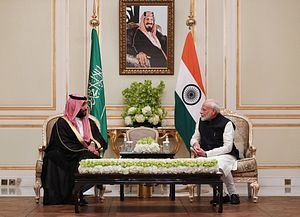India and Saudi Arabia have long enjoyed cordial relations, primarily driven by India’s energy security requirements. But the bilateral partnership has seen important shifts in recent years. According to Indian media reports, the armies of the two countries plan to hold a joint exercise for the first time. The exercise will be conducted in the latter part of the year and the Indian Army contingent will travel to Saudi Arabia for it. The decision to hold joint army exercises appear to be a follow up to the visit of General N.M. Naravane, the Indian army chief, to Saudi Arabia in December.
The navies of the two countries were also planning to hold their first-ever joint naval exercises in March 2020 but it had to be postponed on account of the pandemic. The naval exercise has been rescheduled for the first half of 2021. Prime Minister Narendra Modi’s two trips to Saudi Arabia, first in 2016 and then in 2019, and the visit of Saudi Crown Prince Mohammad bin Salman to India in 2019, have been important in consolidating the bonds between the two sides. All of this suggests that while energy security might continue to dominate the agenda, security and defense cooperation are becoming higher priorities in the India-Saudi relationship.
The recent high-level political visits between India and Saudi Arabia are a sign of greater political attention and demonstration of the intent on both sides to shed their traditional approach, in which Pakistan and Jammu and Kashmir were significant sticking points. This was evident during Indian National Security Advisor Ajit Doval’s visit to Saudi Arabia in October 2019, when the Saudi government reportedly stated that Riyadh “expressed understanding of India’s approach and actions in Jammu and Kashmir,” a comment that referred to the abrogation of Article 370. During the visit of Crown Prince Mohammed bin Salman bin Abdulaziz Al Saud, deputy prime minister and minister of defense of Saudi Arabia in February 2019, Modi and bin Salman “condemned in the strongest terms, the recent terrorist attack on Indian security forces on 14 February, 2019 in Pulwama in Jammu & Kashmir,” demonstrating a more nuanced position from Riyadh and support for India. The “neutral” stand is an important shift in Saudi Arabia’s approach towards India in general and Jammu and Kashmir in particular.
India-Saudi relations began to assume a certain dynamism after Indian Prime Minister Manmohan Singh’s visit to the Kingdom in 2010. The signing of the Riyadh Declaration is considered an important marker in the bilateral ties, elevating the relationship to a strategic partnership. The two sides condemned terrorism, extremism and violence and underscored the importance of combatting terrorism that threatens all societies. The leaders agreed to strengthen information sharing related to terrorism, money laundering, narcotics, and arms and human trafficking. This was followed by then-Defense Minister AK Antony’s visit to Saudi Arabia in 2012, the first by an Indian defense minister to Riyadh. The signing a Memorandum of Understanding on Defense Cooperation in February 2014 was important in strengthening their defense partnership. The two sides also agreed to set up a Joint Committee on Defense Cooperation (JCDC) to identify and augment defense collaboration between the two sides. The committee has had four meetings so far – in 2012, 2016, 2017, and 2019 – with the two sides deciding to engage in training and capacity building exercises, intelligence sharing, and maritime security.
The JCDC meetings have given a spurt to maritime security ties between the two countries. The two sides have been engaged in training and capacity building exercise as well as hydrographic cooperation. The Royal Saudi naval forces have reportedly stepped up naval engagements with the Indian Navy and the Coast Guard, with Indian ships undertaking a number of goodwill visits to Saudi ports since the early 2000s. During one such visit by Indian Coast Guard ship Samudra Paheredar in February 2020, the Embassy of India in Riyadh put out a statement saying that these visits “are symbolic of our desire to enhance our cooperation with the Kingdom in matters of defence.” In an effort to further augment maritime ties between New Delhi and Riyadh, Admiral Sunil Lanba, chairman of the chiefs of staff committee and chief of the naval staff visited Saudi Arabia in February 2018, during which he met the Saudi Deputy Defense Minister Mohammad bin Abdullah Al-Aysesh as well as the heads of the various military services. In addition to these meetings, Lanba also visited the Naval Operations Center, Naval Fire and Rescue School, and Western Fleet at Jeddah, which also involved a visit to HMS Dammam, an Al-Riyadh class frigate. Reports indicated that Saudi Arabia has been keen on strengthening maritime security cooperation with India in the western Indian Ocean, which includes some of the busiest shipping lanes, including those in the Red Sea, the Gulf of Aden, the Arabian Sea, the Gulf of Oman, and the Persian Gulf. These are incidentally of enormous interest to India as well, as highlighted in the Indian Navy’s Maritime Security Strategy issued in 2015.
Saudi armed forces have regularly attended training programs at Indian military institutions including the National Defense College, the College of Defense Management and the Defense Services and Staff College. India and Saudi Arabia have also agreed to strengthen their cooperation in the area of defense production, as indicated by the signing of an MoU between Saudi General Authority of Military Industries and India’s Department of Defense Production.
Overall, India-Saudi Arabia defense cooperation has considerably picked up the pace. N. Ram Prasad, deputy chief of mission at the Indian Embassy in Riyadh, recently wrote in Arab News that “the direction of the India-Saudi bilateral defense relationship remains extremely positive with several initiatives being taken,” also noting that both countries “are ascending powers and major players in their respective regions and are natural partners in addressing the various security challenges confronting the region.” This suggests that these trends are set to continue.

































